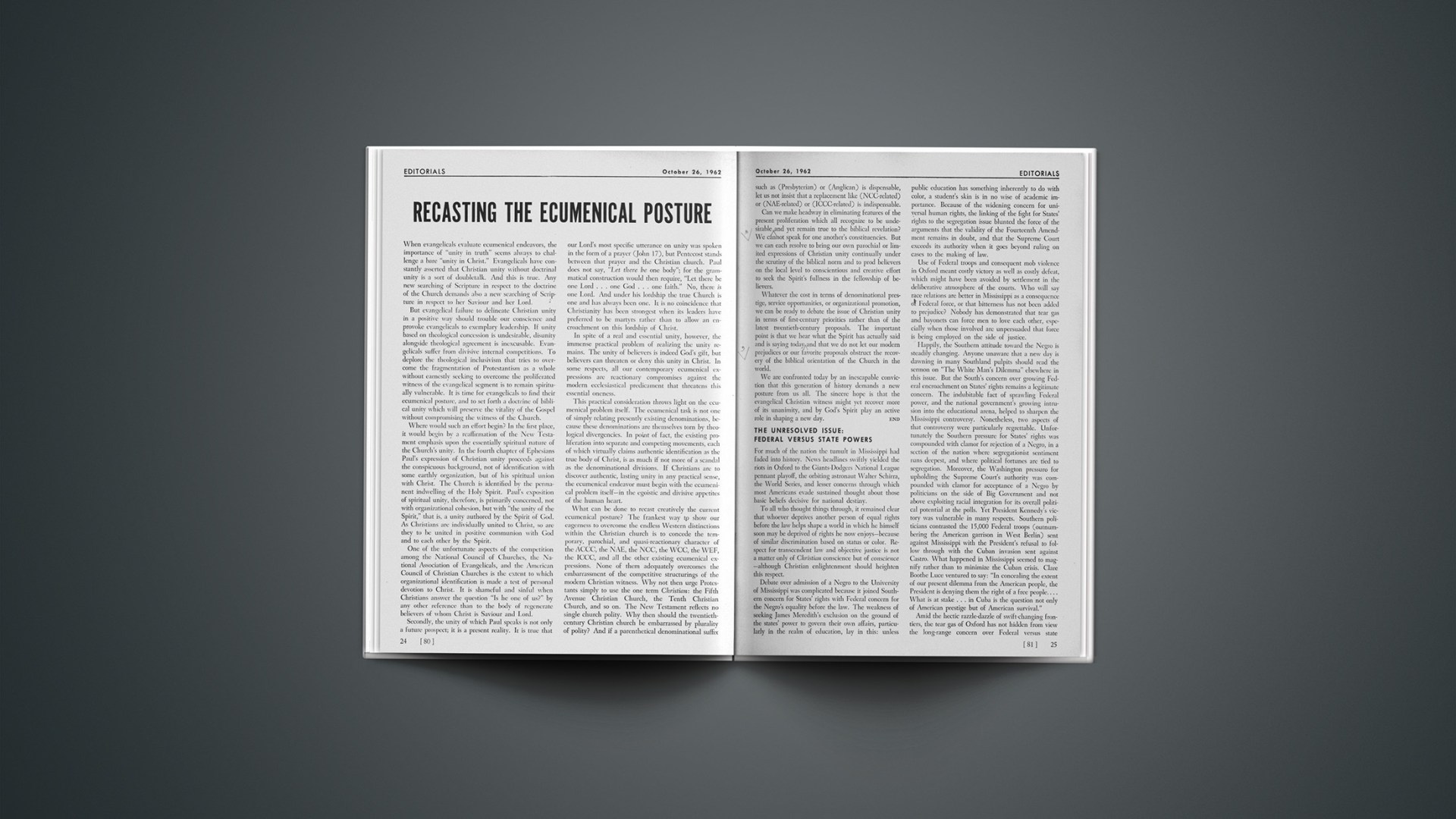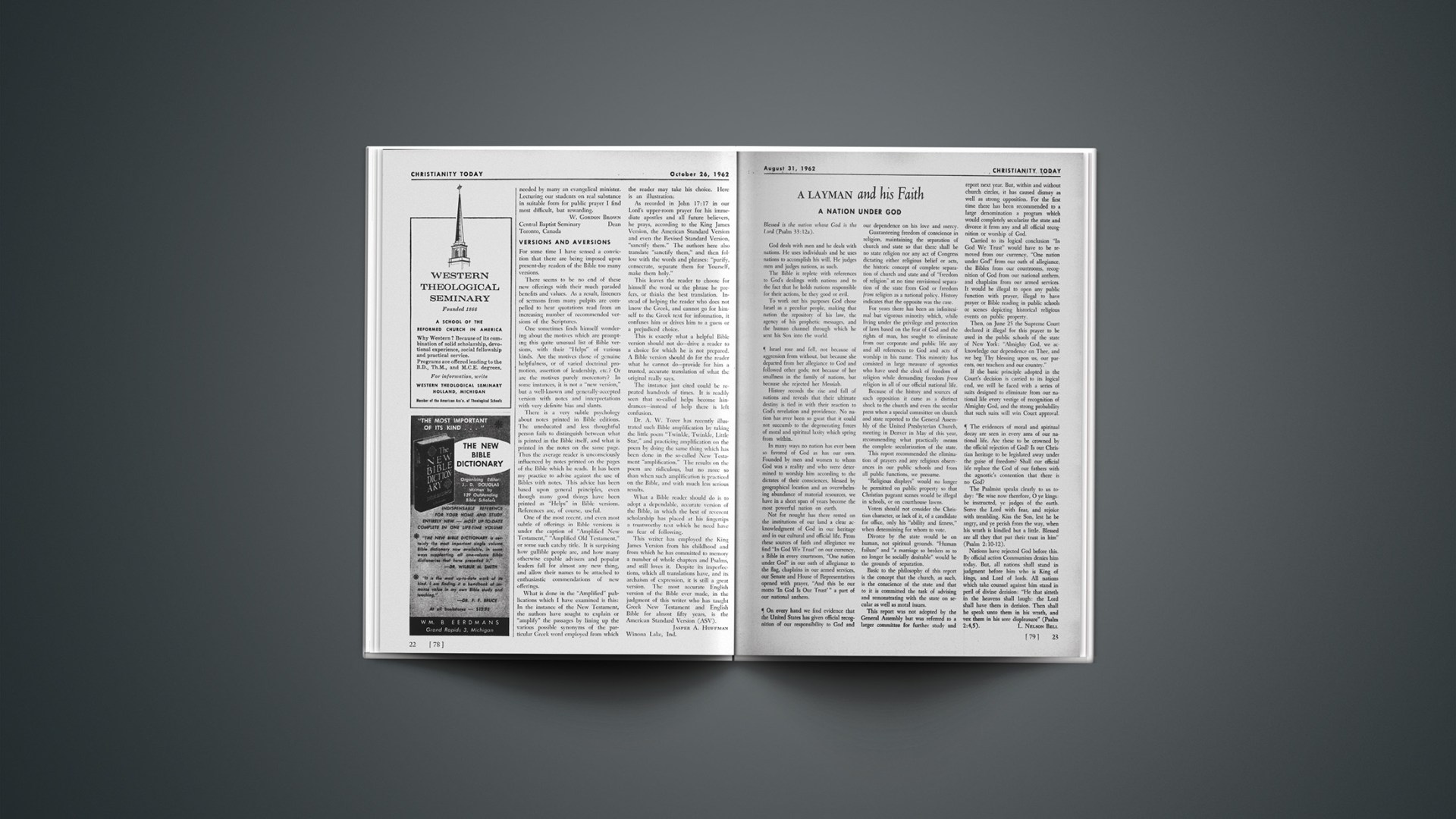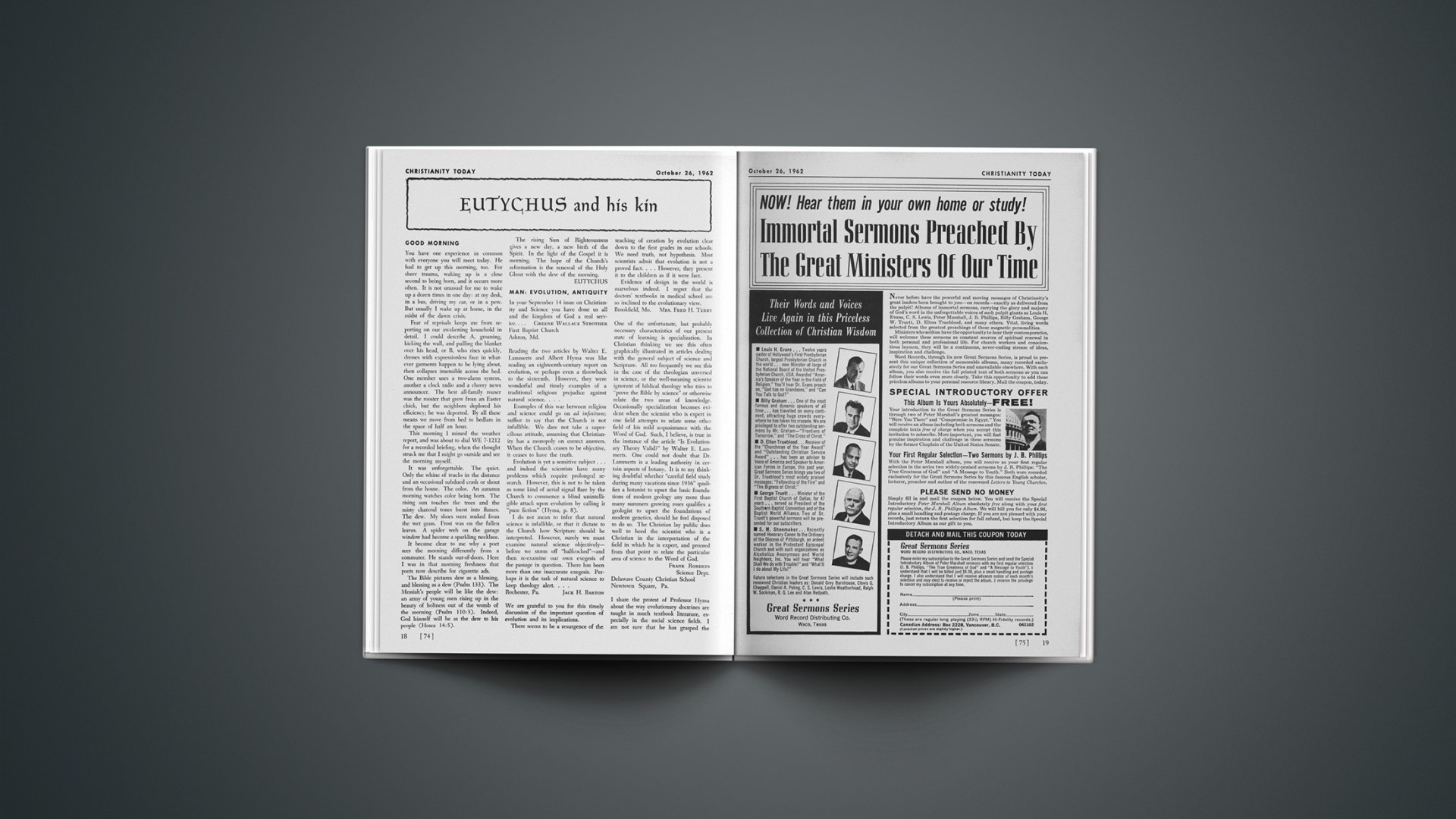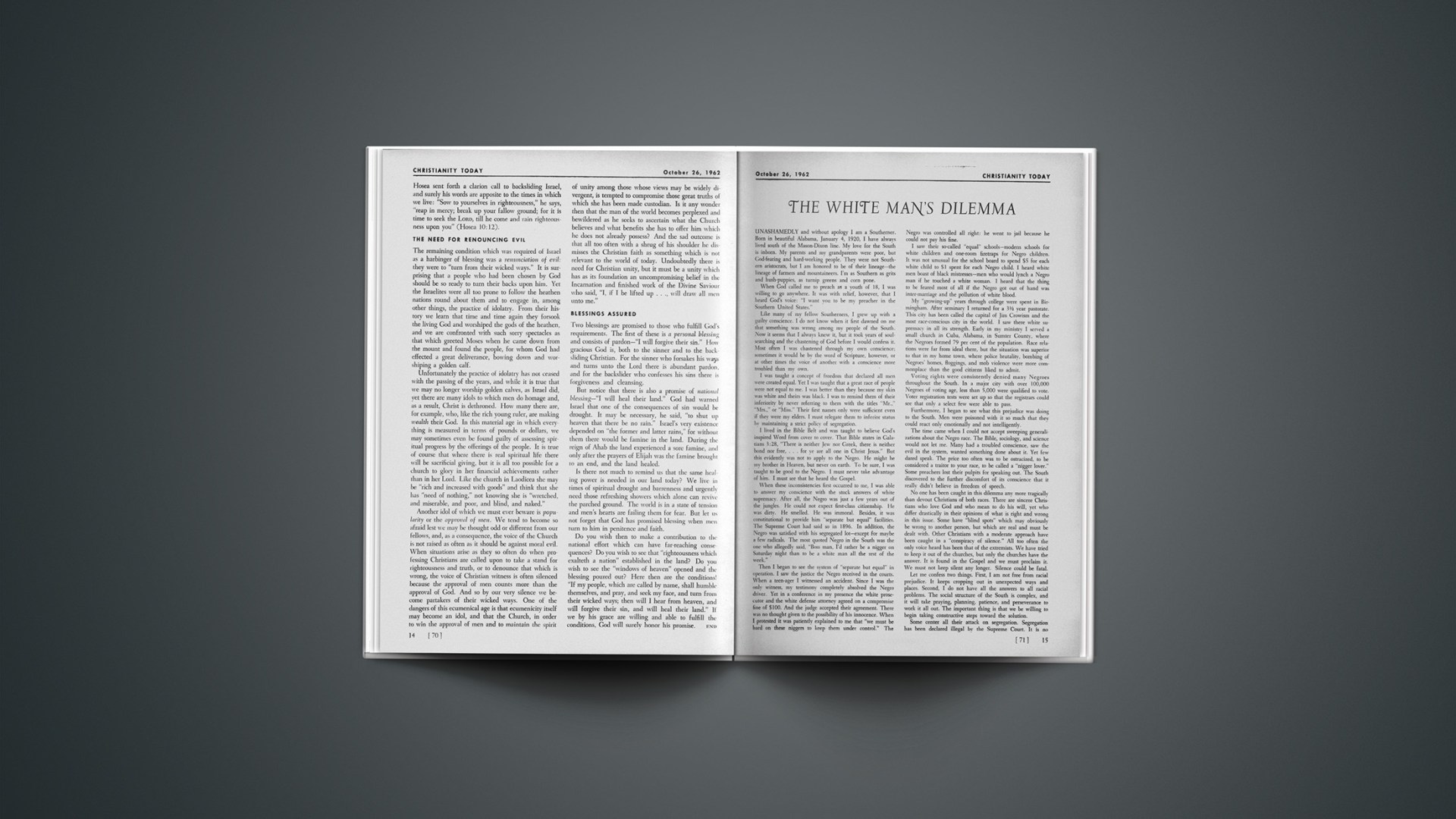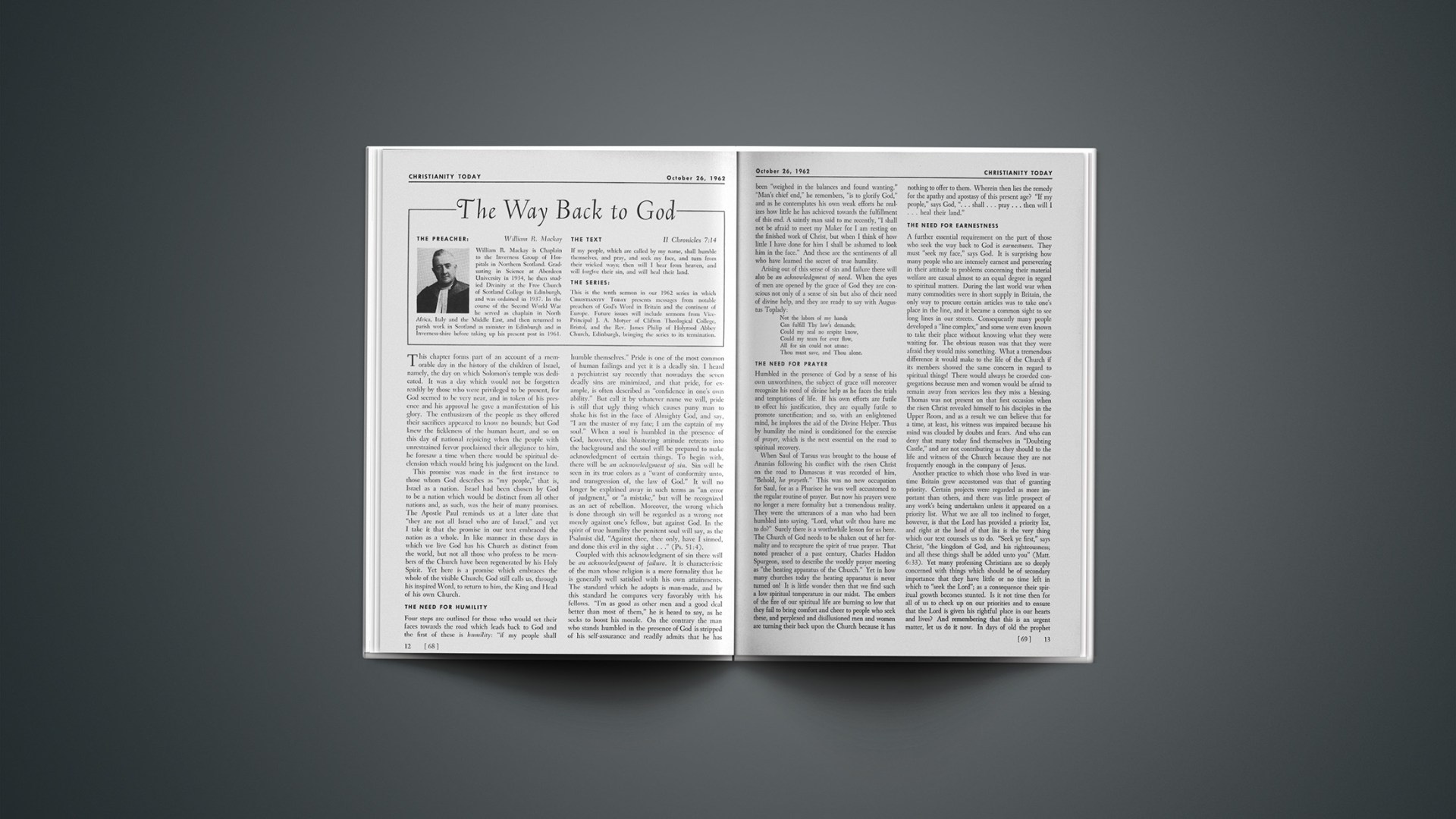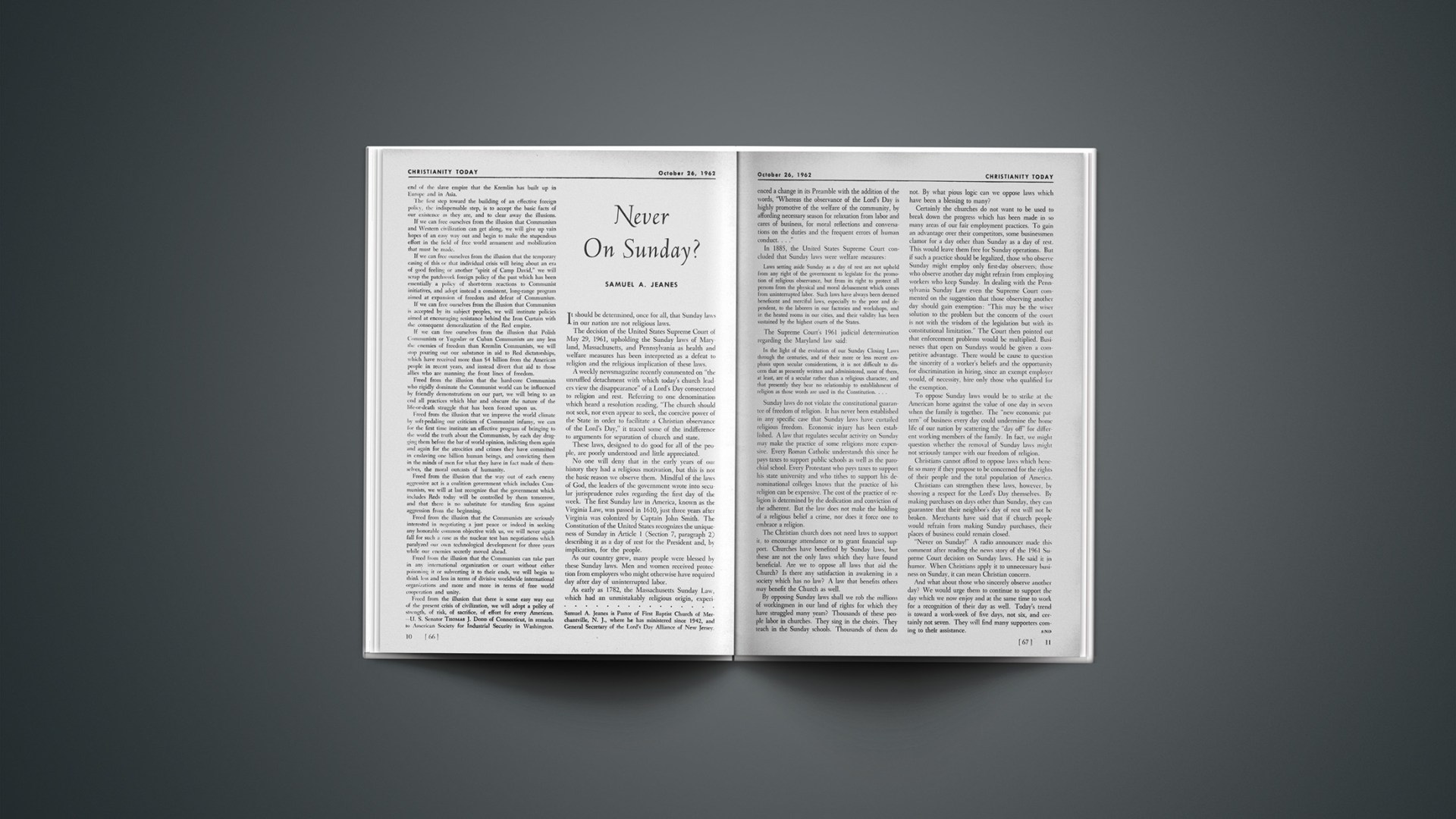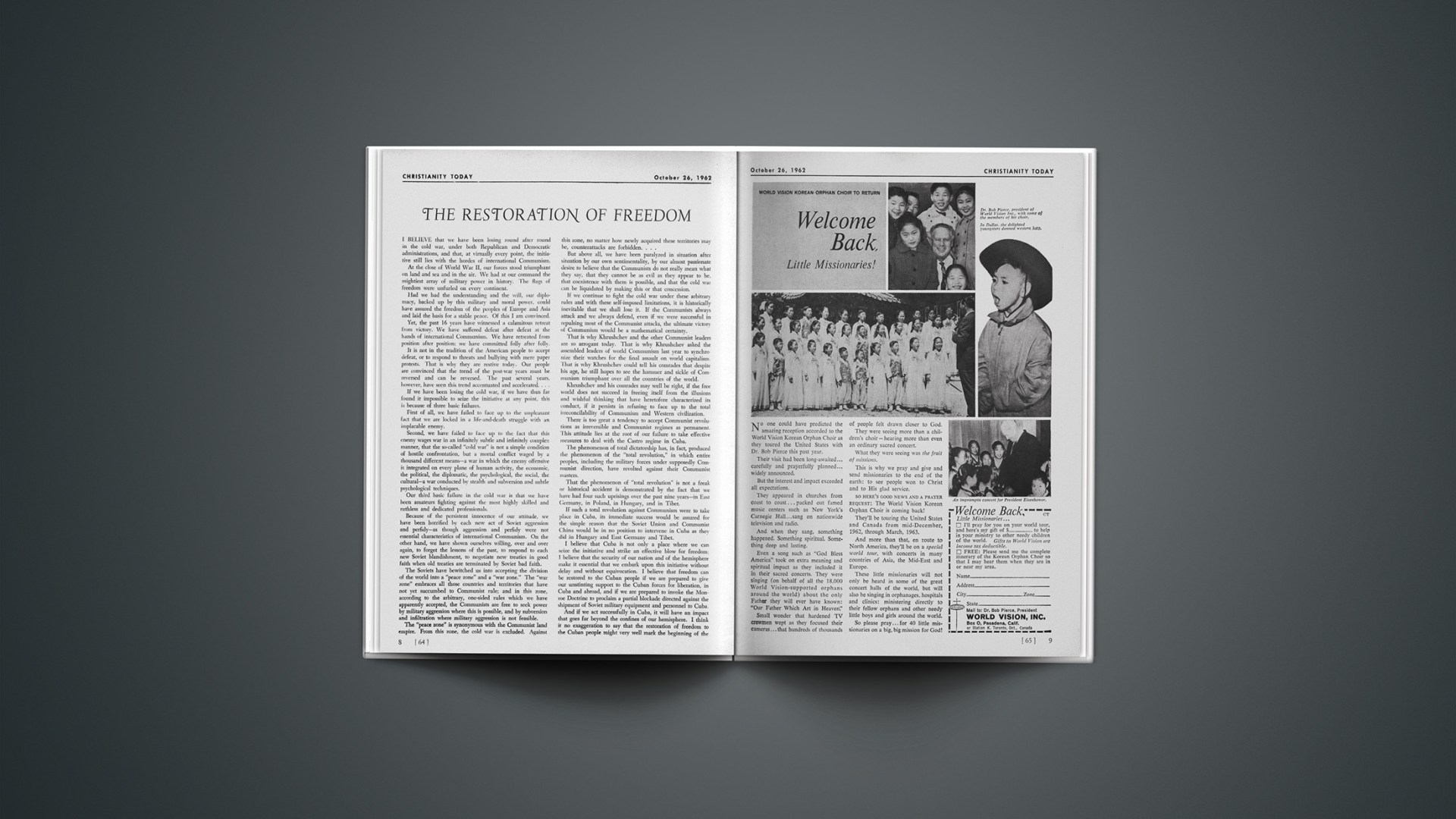From our tenth-floor vantage point of the White House grounds, CHRISTIANITY TODAY’S staff often glimpse some of President Kennedy’s uninvited visitors—particularly the picketers who regularly propagandize Pennsylvania Avenue. More often than any other parade formation the pacifists are there—carrying banners of protest, of pleas for peace on earth, and passing out tracts.
To learn what the pacifists have in mind, I have read their material, corresponded with some of them, and met some in personal conference.
So numerous are motivations for pacifism that it is unfair and unjust to argue that all its champions are in Khrushchev’s camp.
Recently the distinguished Scottish New Testament professor, Dr. James S. Stewart of New College, Edinburgh, made the following comment at Princeton Theological Seminary’s sesquicentennial celebration: “If any Christian should speak out for abolition (of nuclear tests) and then is told that he is a poor dupe, a fellow-traveler, an unconscious victim of Communist propaganda—then this at any rate is a libel and a lie.” American Christians who hold pacifist positions (doubtless a small minority of the church members) do so largely for what they consider Christian rather than Communist reasons, and their sincerity and patriotism are not in doubt.
Were the growing pacifist program in no way influenced by Communist propaganda and objectives, does it fit—both as a political and ecclesiastical activity—into Khrushchev’s strategy? What propagandistic and military use does the Soviet government make of such pacifist activity?
With the modern distortion of language and aversion for defining terms it may be quite possible, even unavoidable, that sometimes the churches and the Communists seem to be saving much the same thing. The disturbing fact, however, is how Communist strategists fit the peace program of the churches into their own program of class hatred and world revolution. When peace-literature, including occasional essays in church and Sunday school publications, takes the same line as is found simultaneously in Communist organs, then our distress must surely deepen. Communist sympathizers often manipulate U.S. public opinion on disarmament and peace and war into propaganda serviceable to the Soviet leaders, men whose temporary goals coincide at points with the announced goals of American pacifists. Commonly shared goals of both Soviet militarists and American pacifists include: recognition of Red China by the United Nations, unilateral American suspension of nuclear tests, demilitarization of Germany, and withdrawal of American troops from South Vietnam.
No Unifying Rationale
Pacifists on parade at the White House and other government locations have no unifying rationale, thus reflecting their widely varied sponsorship. Some quote isolated passages from the Bible. Others tell of nonviolent revolution in India. Some cite statistics to prove the futility of modern warfare. Some are sincere church workers, many have no church connection. Some are left-wingers, some have no creed at all but the vision of a warless world.
Many American pacifists sincerely believe that all war is evil. Some believe further that total disarmament is the only sure road to world peace, while others insist that Christians must shun war whether disarmament is possible or not. So-called “peace churches” espoused this view long before Communism became a global menace. Founded in 1950, the Church Peace Mission sought to unite the claims of pacifist groups within various Protestant denominations, the Fellowship of Reconciliation, and the “historic peace churches” in North America, such as the Brethren, Friends, and Mennonites. Delegates appointed from each communion constitute CPM’s executive committee, whose headquarters are in the Interchurch Center, 475 Riverside Drive, New York City.
The movement’s original objective was not political action but rather the sponsoring of colloquies and literature; its “mission” was that of a pacifist “witness” to the churches. But the “peace churches” soon found themselves involved in a variety of pro-pacifist legislative pressures. Equally disconcerting was the eclipse of the kerygma (Gospel proclamation) as initiated by God and rooted in Christ’s grace. Secular pacifists reduced the Gospel to a humanitarian social ideal that demanded neither repentance nor faith. They promoted peace on earth as a human possibility achievable through legislative repudiation of war, armament, nuclear testing, and so forth. The “sectarian” pacifists did not object to Protestant support of merely secular programs of peace since they sought to commit Christian influence to pacifism by every acceptable means. What the “sectarian” pacifists did deplore, however, was the tendency of American Protestantism to equate this secular demand for peace with the primary intention of the kerygma, thus ignoring the so-called “theological, biblical, and spiritual basis” of pacifism. Although its intentions were spiritual from the first, CPM lacked a fixed theological basis from the outset, sharing as it did the enthusiasm of various and mixed pacifist traditions. While liberal human motivations supplied its dominant spirit in the early years, the movement today lacks any such specific élan, and has no common theology.
Despite the pacifists’ significant propaganda and publicity front, Church Peace Mission is now, in fact, at a life-or-death crossroads. With a maximal membership of 300–500 ministers from all major denominations, CPM has no articulate Christian program, nor has it theological, organizational, or financial strength. American pacifism has not recovered from the crippling defection of Reinhold Niebuhr, whom it nonetheless still respects as a pacifist “heretic.” When World War II exposed the shallowness of liberal optimism, Niebuhr insisted that the tragic dimension of human history requires as much concern for justice as for peace.
In the “post-Niebuhrian era” SPM is still groping for a theological basis for pacifism. At a major meeting in New York in May, 1962, leaders of the movement critically reviewed its history, analyzed the results of a questionnaire to theologians, and debated whether to disband, to continue on present lines, or to institute a new executive organ. The following month a search for fresh theological focus was made in a pacifist—non-pacifist discussion in McLean, Virginia, “under the shadow of the new CIA building.” While the searchlight of biblical imperative was focused on excessive claims made on Christians by the national ethos, no conclusions were drawn.
According to some Mennonites, the present situation offers new opportunities to promulgate the historic view of the “peace” (pacifist) churches. In contrast to religious movements that actively try to eliminate tragedy and struggle from secular history, Mennonites, by tradition, withdraw from the world and take a pessimistic view of secular history. They argue that to apply biblical realism to history means not programs of one kind or another but focusing exclusively on what God does in Christ to bring about a new age. They sense a readiness among present-day pacifists to listen to “Christian love as the only alternative to warfare” because the older liberal pacifism is losing its hold and no vigorous alternative has arisen. Revival of theological study and “biblical realism,” some “peace church” leaders think, points the way to a kerygmatic orientation of pacifism. Perhaps as a part of this spirit, the Church Peace Mission has recently appealed to biblical scholars in Protestant seminaries to set their protest against the nuclear weapons race and the cold war in the context of the Christian Gospel.
While CPM disclaims any official commitment to “nuclear pacifism,” it has eagerly received and widely circulated (to ministers, teachers, and divinity students) a pamphlet, endorsed by ten professors in leading seminaries, that promotes nuclear pacifism. This pamphlet, “A Christian Approach to Nuclear War,” says, among other things: “There is no meaningful way in which one can speak of a ‘just war’ fought with atomic arms … Christian faith and the precepts of the Gospel cannot consistently support the manufacturing and stockpiling of nuclear weapons for purposes of ‘deterrence.’ … The risk of enslavement at the hands of another nation is not so fearful a thing as the risk of effacing the image of God in man through the wholesale adoption of satanic means to defend national existence or even truth … This [Christian] tradition points rather to the need of surrender of some measure of sovereignty by modern nations and the establishment of international law by consent backed by discriminate use of police force under the direction of the United Nations or some form of world government.”
Communist Propaganda and Pacifism
To what extent are pacifists drawing inspiration and direction from Soviet sympathizers? It is not always easy to distinguish Communist techniques and programs toward pacifism from pacifist ventures that sincerely desire world peace. Now that disarmament has become an official U. S. objective, the line is not drawn too sharply even in government circles. Peace crusaders—whatever their “labels”—are quickly credited with sincerity and loyalty.
Things were different a decade ago when disarmament had such champions as the American Peace Crusade. Organized in 1951, APC in 1954 was designated a subversive organization by the government. In 1955, in fact, APC was dissolved by the Attorney General when the Subversive Activities Control Board reported that the Crusade was operated, directed, and supervised predominantly by members and functionaries of the Communist Party who did not publicize this relationship. Noted the Control Board: “While ostensibly promoting various positions and programs as necessary in order to have peace throughout the world … [the ACP] in fact promotes and advances the positions and programs of the Communist Party.”
Today’s pacifist is as likely to draw motivation from the churches as from the Communists. Marjorie Swann, a 39-year-old housewife and mother of four children, was sentenced in 1960 to six months in prison for trespassing on the site of a government missiles base near Omaha. Years before, as a Northwestern University co-ed, she joined a Methodist Young People’s Fellowship whose pacifist minister frequently asked: “Can you imagine Jesus Christ in an army uniform?” She became a pacifist and offered her services to the National Committee for Conscientious Objectors in Washington, D.C. Here she met and married Bob Swann, who had just finished a prison term for refusing to report for military duty when his registration as a conscientious objector to World War II was disallowed as not required by his religious background. Both became active in the Peacemakers, and Marjorie later joined in this group’s 30-mile walk from Omaha to the Army missiles base for a demonstration. Her husband was later arrested for picketing CIA headquarters as a member of the “Fair Play Cuba Committee.”
Whether aware of it or not, the pacifists on parade are made the constant subject of Soviet radio propaganda that imputes a militarist image to the U. S. Communist propagandists, in fact, sometimes reveal an awareness of apparently isolated “peace demonstrations” that suggests these activities to be somehow masterminded by and interrelated, let alone foreknown, to Communist functionaries.
As head of a delegation of 50 U. S. women to the Geneva disarmament conference, Mrs. Cyrus Eaton was quoted on April 12, 1962, as saying in a Hungarian radio interview: “We could see for ourselves at Geneva that the desire for an understanding is lacking.” If her delegation’s request for an audience with President Kennedy is declined, she said, “we shall parade in front of the White House to make known our demand that the disarmament question must be solved … We, peace-loving American women, will do all in our power to help bring about agreement or disarmament.…”
On April 20, Tokyo’s KYODO broadcast word that the Japanese Council Against Atomic and Hydrogen Bombs (Communist front of the WPC) “has instructed its chapters throughout the country to mobilize their forces to halt the imminent U. S. nuclear tests on Christmas Island. The instruction was given under an agreement reached at an emergency meeting of the council’s standing committee.… In response to the instruction, the Kanagawa ban-the-bombers are scheduled to hold a rally 21 April at Miura.… Similar rallies are also slated at Yaizu, Shizuoka Prefecture and three other places.”
Moscow radio reported on April 21 that “the forthcoming U. S. nuclear tests in the Pacific have evoked a wave of protest throughout the world.… Each new series of nuclear tests increases the radioactive contamination of the atmosphere, harming the life and health of present and future generations. Prominent Soviet atomic scientists … believe that the American tests will be the dirtiest ever carried out by the United States.… Not a single person was a victim of radiation as a result of the Soviet tests carried out earlier, while the American tests each time resulted in a large number of casualties. It is no accident … that the United States is to conduct this new series of tests not at home in Nevada but at Christmas Island in the Pacific, thousands of miles from its homeland.… Most of the fallout will primarily cover Indonesia, India, South Vietnam, Cambodia, and nearly all of Africa, while its fringes will take in the Middle East and Latin America.… Eminent American scientist and Nobel Prize winner Professor Pauling has estimated the damage the American tests will do to the coming generations.… According to the most conservative estimates, the increased radiation resulting from the U. S. tests will lead to the birth of about 286,000 children with great physical and mental defects. In his letter to The New York Times, Professor Pauling noted that according to estimates the number of victims from these proposed atmospheric tests, including deaths of embryos and still births, will reach about 3 million.”
On April 21, 1962, Peking radio broadcast this message to Asia: “A group of American students, intellectuals, and housewives started a peace ‘march’ to New York from Edison, New Jersey, on Thursday.… This peace demonstration was sponsored by the Peace Action Committee, a joint organization of various peace organizations.… When the procession passes through the industrial cities of Elizabeth, Newark, and Jersey City, more peace supporters will join it. As soon as the procession arrives in New York a big demonstration will be held in front of the U.N. building. On this peace ‘march’ the Peace Action Committee … demanded that the U.S. government immediately end all preparations for the resumption of nuclear weapons tests in the atmosphere. Also on Thursday a total of 130 university faculty members issued a statement opposing the resumption of nuclear weapons tests in the atmosphere.”
The following day Peking radio reported to Asian listeners: “Five thousand American peace champions held a big demonstration in the center of New York City yesterday in protest against the Kennedy nuclear testing.… Most of the demonstrators were college students.… Before the U.N. headquarters … Homer Jack, executive director of the Committee for a Sane Nuclear Policy, urged those present to send telegrams to Kennedy urging him to suspend the planned U. S. atmospheric nuclear weapons tests. On the same day demonstrations against the resumption of nuclear tests were also held in Boston, Los Angeles, Philadelphia, Hartford, Chicago and Buffalo.”
A Moscow Domestic Service report to the Russian people in April began thus: “Picketing of the White House is becoming a routine event in the life of the American capital.… This week protest demonstrations against nuclear tests … are sponsored by the Organization of American Women for Peace.” The report singles out as a demonstrator “the well-known public figure, Mrs. Cyrus Eaton.”
A Pravda article on April 14, 1962, quoted a minister of the United Church of Canada, James Endicott, a member of the Presidium of the World Peace Council and chairman of the Canadian Peace Partisans Committee, as asserting that “the missing link between the present and the future is disarmament” and that “the basic task of the peace partisans movement is the mobilization of broad public opinion in defense of the idea of disarmament.” It further summarizes his views: “Today no man with common sense can fail to consider war anything but a means of destruction.… The bosses of the huge monopolies … with the aid of their political representatives … make use of every opportunity to prevent agreement on disarmament.”
We might well ask: What recent developments in U. S. foreign policy are commended by the pacifists? The Friends Committee on National Legislation cites five “elements of progress”: (1) Soviet-U. S. agreement on the preamble for a disarmament treaty; (2) President Kennedy’s support of the goal of “general and complete disarmament”; (3) creation by Congress of the U. S. Arms Control and Disarmament Agency for preparing agreements; (4) reconvening of the Geneva disarmament discussions and their enlargement to include 17 nations, among them 8 neutrals; (5) U. S. proposals on Laos and reportedly on Berlin which would exclude solutions by force.
Pacifists and U. S. Policy
Pacifists are not necessarily satisfied with these goals. Not long ago certain spokesmen for the Friends Committee deplored (what they depicted as fact) that “only 14 people in the U. S. Government are working on disarmament.” Now that a separate disarmament agency has come into existence they complain that its budget is “only 1/8000th of what the defense department is getting.” (For the fiscal year beginning July, 1962, the disarmament budget runs $2 million for overhead, $4.5 million for research.) The Friends Committee is distressed because the U. S. defense budget has increased by $7.5 billion since President Kennedy assumed office; it wants “real give and take” in the Geneva conference; it deplores the “gap in atmosphere between Capitol Hill and Geneva” in respect to U. S. enthusiasm for disarmament (and recalls President Wilson’s inability to commit Congress to his goals for the League of Nations). The Committee thinks the U. S. should take more initiative to lessen cold war tensions. We should end travel curbs in the U. S. for Soviet nationals, for example, and close down some of our foreign military bases. And, even if no similar agreements are made by the Soviets, we should renounce biological warfare, says the Friends Committee, and convert such chemical research projects (as in Maryland) into health centers.
U. S. government leaders are not starry-eyed about total disarmament prospects however. In fact, the ideal of “general, complete or total” disarmament—usually shortened simply to “disarmament” since the 1932 World Disarmament Conference—is regarded at present as more illusory than realistic. U. S. leaders are much more interested in “specific steps toward disarmament” which do not jeopardize the nation’s military strength and security. Proposed April 18, 1962, in the U. S. treaty on disarmament—some statesmen called it “the most complete and rational exposition ever presented to a disarmament conference”—was progressive control over armaments that looks toward eliminating the dangers of war. Main features include: (1) balanced stages of progressive disarmament that grant neither side a temporary advantage at any point; (2) inspection and verification; (3) strengthening the United Nations for greater security through the operation of international law and an international police force.
The U. S. hopes that at least secondary reasons—such as the expense burden of missile and anti-missile operations and the reduction of war risk by confining nuclear and thermonuclear weapons to the present possessors (the U. S., the Soviet, Britain, and, to some extent, France)—will win the Soviet over to some of these objectives.
Despite Soviet clamor for world peace and its propaganda barrage against the capitalistic warmongers—while relentlessly promoting class warfare—the disarmament talks have reached no agreement beyond the preamble. Even on this level the Russians on May 29 of this year repudiated the joint declaration against war propaganda. Russia, moreover, had violated the earlier atmospheric test ban treaty, and to this day has thwarted all subsequent attempts to bring about a test ban agreement either in the Geneva talks or at the U.N. The Soviets’ main objection centers in the amount of inspection and verification; they approve verification only of the “bonfire” to destroy stipulated weapons, but deplore anything further as “espionage.” Some leaders think an important point is involved here which should concern the U. S. also; that is, if one side finds itself strategically ahead of the other in the disarmament process, it might swiftly strike a crippling blow at the other. For this reason U. S. negotiators are now calling for only minimal inspection on a zonal sampling basis. While this procedure involves risks, these presumably will lessen by the time all zones are open for total inspection. Throughout the process, moreover, each side would no doubt protect its own security.
Mainly due to the sobering presence of the new nations, the Geneva talks have yielded a good atmosphere, “fairly business-like” discussions, and absence of Soviet invective. Whereas the U. N. has somehow elicited impractical slogans like “ban the bomb” from the young neutral powers, Geneva has exposed them to the unpredictability of the Soviet and the real complexity of disarmament. While American delegates hope to wear the Russians down by making disarmament a continuing major issue in international affairs, they in no sense predict a peril-free world by 1963. At least one delegate has rented a home in Geneva on the premise of a life-long period of discussion.
The secular world harbors multiple doubts and reservations about the value of the disarmament negotiations. An especially live concern is efficacy of any verification system. Skepticism of Soviet sincerity is one contributing element to this mood. If, by contrast, the disarmament negotiations were transpiring between the U. S. and Canada, little of the present popular suspicion and mistrust would be in evidence.
Signs of Soviet Insincerity
What proof have we that the Soviet’s “peace posture” is insincere? First, the history of Communist aggression since 1916 is a matter of record: Communism has entrenched itself over three-fifths of all the earth’s land space, has engulfed more than half our globe’s population, and on an overall average is still striding on at the rate of 55,000 square miles a day. Second, the unrenounced aim of Communism to bring about a proletarian panacea by world revolution is well-known. “We will bury you,” said Khrushchev of American capitalism, at the very time he preached the virtues of peaceful coexistence. According to the 1961 Communist manifesto, “peaceful co-existence of states does not mean renunciation of the class struggle.… Peaceful coexistence is a policy of mobilizing the masses and launching vigorous action against the enemies of peace.” Third, while Soviet spokesmen denounce the U. S. for its “warmongering,” in supposed contrast to the Soviet love of peace, the widest possible circulation is given in Russia—as U. S. negotiator Walter Dean noted at the Geneva disarmament talks—to books that affirm the inevitability of war. We read in The Communist Manifesto of Marx and Engels: “The Communists … openly declare that their ends can be attained only by the forcible overthrow of all existing institutions.” All the while the Soviet propagandizes for peace, it deals in cold war deception, promotes class warfare, and engages in military aggression.
At one and the same time the Kremlin assumes a posture of peace and promotes limited objectives through religious and ethical organizations that oppose nuclear and conventional warfare or both. Operations of Soviet functionaries in the Church Peace Council illustrate our point. Recent admission of the Russian Orthodox Church into the World Council of Churches provides Soviet churchmen extensive opportunities in the Free World to propagandize against armaments stockpiling and nuclear testing. Russian-born Dr. Alexander Kischkowsky, currently teaching Slavic languages in the University of Southern California, in his book Die sowjetische Religionspolitik und die Russische Orthodoxe Kirche, published 1960 in Munich, asserts that the Russian Orthodox Church is anything but a free partner of the state and is compelled to further Soviet goals in peace and in war. Formerly a lector in the Russian Church, Kischkowsky in his volume traces, from 1945 on, the Soviet regime’s brazen exploitations of its relationship with the Orthodox Church to advance Communist goals.
The Soviet record to date—its tendency to downgrade the concessions already made by the U. S. in its disarmament appeals; its rejection of President Eisenhower’s “open skies” proposal; its resumption of nuclear testing in violation of a test-ban agreement; withdrawal of its own offers when they are met (including proposals to ban atmospheric tests and the recent agreement to forego war propaganda)—is hardly encouraging. In a completely disarmed world, moreover, the Soviet realm by sheer force of numbers would still exert tremendous influence in Europe, and internationally through use of its U.N. veto.
A further problem is Red China, which cannot be excluded in any effective plan for a warless world. Currently the Chinese Communists wish to stay outside the disarmament discussions and have criticized the Russian Communists, at times even publicly, for discussing disarmament. And the U. S. and the Soviet have tacitly agreed to bypass discussions with Red China for the present, the Russians being more flexible in these circumstances. At the same time, Red China has openly declared she will not agree to disarmament at any stage unless she is “in on the negotiating process.” Both the U.S. and Russia know that broad disarmament is impossible without Chinese participation. Although Red China does not yet have atomic weapons nor bombers nor missiles to deliver them, the peril of their 4–5 million men under arms is as great to Russia as to the U. S. The U. S. objective is to bring Red China into the negotiating process after the first stage of disarmament is worked out with the Soviet.
Equally disconcerting is the disarmament proposal’s ultimate dependence on an international police force and a revitalized United Nations. In view of the U.N.’s disappointing record in exerting influence and force, is it realistic—it is asked—to expect the U.N. to rule by law in the foreseeable future? The U. S. disarmament proposal includes a strengthening of the U.N. in the first stage of disarmament implementation.
Propagandists for World Government
An International Disarmament Organization to be established with the U.N. when the disarmament treaty becomes effective would verify the process of disarming. In the first stage (to take three years) the IDO Control Council would confirm a 30 per cent arms reduction in most categories, including non-nuclear arms and delivery systems for nuclear weapons; it would confirm the cessation of production of weapons-grade fissionable material and transfer of agreed quantities to non-weapons purposes; it would confirm a manpower reduction of 25 per cent in armed forces to 2.1 million men in both the U. S. and the U.S.S.R. Participating nations meanwhile would prepare for setting up a U.N. Peace Force to operate in the second stage, and would accept the compulsory jurisdiction of the International Court of Justice. In the final stage of disarmament the U.N. Peace Force would reach full strength and wield such power that no single nation could challenge it.
No doubt the present U. S. proposal includes an eventual transition point where Russia will dominate the European-Asian land mass and American defenses will concentrate in the Americas. This stage, however, will come at a time in the disarmament process (as American planners see it) when world power relationships would already be determined by political factors rather than by arms. Infusion of new authority into the U.N., it is thought, could be achieved by revising its charter. One proposal is that member nations represented on the International Disarmament Commission be required to waive their U.N. veto. But the attempt to widen the role of the U.N. runs counter to much disillusionment over that organization’s effectiveness, and to a feeling of many citizens that the U. S. ought not tie its future destiny wholly to the U.N. Some vocal critics even call the U.N. an extravagant liability.
Underlying the projection of complete disarmament is the concept of ultimate world government, an aspect of current disarmament discussion that greatly gladdens the World Federalists. An executive of the National Council of Churches active in international affairs has remarked: “World government is almost built into the concept (of general disarmament).”
Protestant ecumenical leaders are already planning a post-Delhi conference on disarmament along supernational lines; on the premise that suspicion diminishes as people work together, participants will be invited from both the free world and the Soviet sphere. Their suggestions are to be funneled to the U. S. Arms Control and Disarmament Agency.
Pacifist Gains in America
How has the pacifist impact left its mark on U. S. foreign policy? Disarmament, except beyond the point of absolutely essential security, has always been accepted in America, a country which dislikes the image of a military state and has no aggressive military objectives. But the ideal of full disarmament—in President Kennedy’s words, “to advance together step by step, stage by stage, until general and complete disarmament has been achieved” (Sept. 25, 1961)—is indubitably a pacifist program. The fact that the proposed U. S. treaty on disarmament as its final stage projects a “U.N. Peace Force” in “full strength with such power that no single nation can challenge it” reflects the ideals both of pacifists and one-worldists. But in the American official attitude toward war as something to be avoided at all cost the pacifists have registered an even deeper gain.
American statesmen recognize the misleading manner in which Communists agitate for peace. To the Kremlin a peaceful world means a classless society. And by insisting that certain wars are legitimate, particularly “wars of liberation” (in other words, revolution against established authority other than their own!), Soviet leaders agitate night and day to promote class warfare.
But the American counterthrust to the Soviet premise that some wars are legitimate (that is, useful to advance Communism) marks a radical pacifist departure from past convictions. Strategists now shaping U. S. disarmament policy are dedicated to the premise that any and all war should be avoided. This simple formula neatly avoids the basic question of a just war; in fact, it implies that war is always the worst evil, and seems to approach a “better Red than dead” philosophy. The disarmament diplomats do not label all unlimited nuclear wars unjust, nor even all nuclear wars, nor even all wars of whatever variety. The words just and unjust seem foreign to their vocabulary. They approach the question of war only from the ideal of a warless world, and refuse to reckon with conditions under which war may be unavoidable and necessary because just. If it is true that all war should be avoided, then a surprise enemy attack that seriously cripples our military capacity would leave no option but surrender. American delegates to the Geneva disarmament talks have asserted that the Soviet Union has neither the first- nor second-strike nuclear capacity to destroy the U. S.; further, the U. S. is determined, they say, to retain a second-strike capacity during the first disarmament stage. But if war cannot be justified even under the circumstance of repelling an aggressor, the maintenance of retaliatory capacity seems senseless, if not abnormal. The pacifist premise that war is always evil, that no war can be just, seems therefore to have made considerable headway in the highest American circles devoted to disarmament diplomacy.
Pacifist spokesmen think that if they now “spell out” what a disarmed world would be like, swift sympathy can be gained for disarmament. Proponents of such an idea little suspect how unusual in human history is the vision of world peace. It appears first in a biblical setting. At a time when totalitarian tyrants threatened tiny Israel on two sides, the prophet Isaiah spoke of a coming day when swords will be turned into plowshares and the knowledge of God shall cover the earth. But Isaiah’s vision of world peace is messianic; as a spiritual work of grace that renews sinful man’s warring nature, peace on earth will be the final supernatural climax to human history. Borrowed by modern idealists, this ideal of a warless world, now often vitalized more by secular evolutionary motifs than by biblical principles, is being spooned to a generation that no longer accepts the Judeo-Christian view of human depravity. Modern man seems unaware that the Christian Gospel not only challenged the military virtues of the pagan world but also replaced them with virtues like peace and compassion; he fails to realize that this Gospel calls for spiritual rebirth into a new race of redeemed men. Today the messianic vision of a warless world is being torn from its proper context and being superimposed upon a post-Christian outlook. And it is being grafted upon a post-evolutionary mood that no longer basks in Charles Darwin’s optimistic view of history but is stirred rather by the revolutionary claims of Karl Marx. C. F. H. H.



